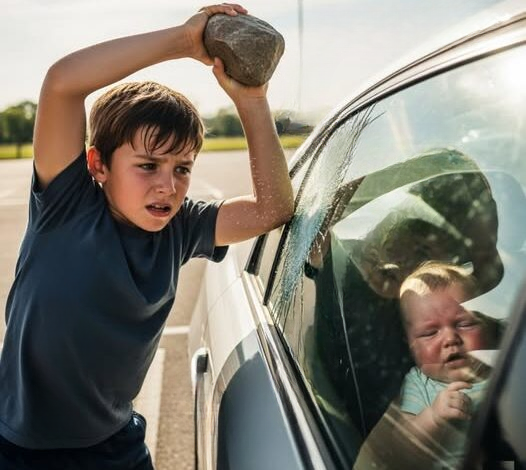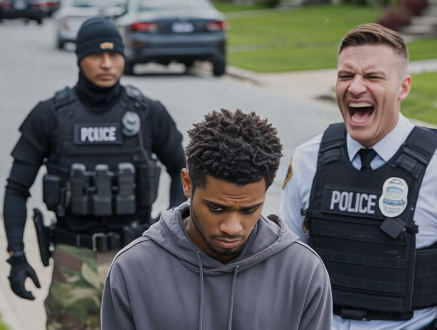Eight-year-old Liam Parker was late—again. His small legs pumped furiously across the grocery store parking lot, backpack straps bouncing with every stride. The thought of Mrs. Grant, his teacher, and the lecture he would face ran through his mind like a warning bell. One more tardy, she had said, and she would call his parents. That thought alone made him push harder, ignoring the heat, the sweat, and the sharp sting in his scraped knees.
Being late had become a pattern for Liam, a small boy with an active imagination and a restless spirit. He had always been energetic, sometimes impulsive, often distracted by the smallest of things. His parents, while loving, struggled to keep up with his quick pace, his curiosity, and his tendency to focus on the world around him rather than the task at hand. Today would prove that sometimes, distractions can save lives.
The Moment That Changed Everything
As Liam sprinted past a row of parked cars, something unusual caught his attention. He slowed and then stopped, heart hammering. Inside a silver sedan, strapped into a rear-facing car seat, was a baby. The child’s face was blotchy and red, glistening with sweat. Tiny fists banged weakly against the straps, muffled cries escaping only faintly past the sealed windows. The baby’s head lolled slightly to one side, mouth opening and closing in exhausted whimpers.
Liam’s chest tightened. Panic mingled with fear and determination. He tapped frantically on the glass. No response. He tried the car handles. Locked. The cries grew softer, fading almost to silence—and that silence frightened him even more. The parking lot stretched empty around him, with no adults in sight. His school was only a few blocks away, but leaving the baby behind felt unimaginable.
Frantically scanning the area, Liam spotted a jagged rock near the curb. It was heavy, far heavier than anything his small hands had lifted before. He whispered an apology to the car, “I’m sorry, Mister Car,” and lifted it with trembling arms. Strike after strike, the rock fractured the glass until a spiderweb of cracks finally shattered.
The stench of hot vinyl, sweat, and heated metal filled his nostrils as he reached through the jagged hole, unbuckling the baby’s straps. Carefully, he lifted the child into his arms, cradling him against his chest. “It’s okay. You’re safe now,” he whispered, rocking the baby gently.
Then a scream cut through the air:
“What are you doing to my car?!”
Frozen, Liam watched as a woman ran toward him, groceries tumbling to the asphalt. Fury was etched across her face, but it melted away the moment she saw her baby in his arms. Dropping the grocery bags, she snatched the child to her chest, pressing frantic kisses to his face. Tears streamed freely.
“Oh my God! I was only gone for a few minutes to get milk,” she said, voice breaking. Then, eyes locking on Liam, realization dawned. “You saved him. You saved my baby.”
Before he could respond, the distant clang of the school bell rang. Panic surged—not from fear of the mother, but from fear of being late yet again. Without explanation, Liam bolted toward school, heart pounding, legs trembling.
Facing Consequences
Minutes later, Liam stumbled into his classroom, hair plastered to his forehead, palms still stinging from the shards of broken glass. Mrs. Grant’s sharp eyes found him immediately. Arms crossed, she said, “Liam Parker, late again.”
The classroom went silent. All eyes turned to him. Liam wanted to explain, but how could he tell a story about breaking a car window to save a baby without sounding like he was spinning some impossible excuse? His throat closed.
“I—I’m sorry, Mrs. Grant,” he stammered.
“That’s it,” she replied firmly. “We’ll be calling your parents. You must learn responsibility.”
Shame burned in Liam’s cheeks. The cuts on his hands throbbed, but the image of the baby’s terrified, sweaty face stayed vividly in his mind. No one clapped, no one said thank you. At recess, a few children teased him. “Always late, Parker,” one sneered. Others ignored him entirely. Liam stayed silent, staring at his bandaged hands, reminding himself he would act the same way again if it meant saving a life—even if no one believed him.
Recognition and Gratitude
That afternoon, just before dismissal, the classroom door opened. The principal stepped in, followed by the woman from the parking lot, holding her now calm and resting baby. Silence enveloped the room.
“Mrs. Grant,” the principal said gravely, “we have something important to share.”
The woman’s voice trembled as she spoke. “This boy saved my child’s life today. I left him in the car for only a few minutes. When I returned, Liam had already broken the window and pulled him out. If it weren’t for him…” She pressed the baby to her shoulder. “I don’t know if my son would still be here.”
All eyes turned to Liam. His cheeks flushed once more, but this time with pride instead of shame.
Mrs. Grant knelt beside him, placing a hand on his shoulder. “Liam… why didn’t you tell me?”
“I thought you wouldn’t believe me,” he whispered.
Her eyes softened. “You didn’t just save a baby. You showed courage, empathy, and decisive action.”
Applause erupted. Some children shouted, “Hero!” Liam’s eyes filled with tears, but he smiled shyly. The mother knelt beside him, brushing his hair back and pressing a gentle kiss to his forehead. “You’ll always be part of our family’s story. We’ll never forget you.”
Lessons in Courage and Responsibility
Liam’s story became more than a tale of heroism—it became a lesson in responsibility, empathy, and situational awareness. It reminded children, parents, and teachers alike that courage is not measured by age, size, or strength, but by the willingness to act when it matters most.
For children, the story demonstrates that even small acts can have enormous impact. It reinforces the importance of paying attention to one’s surroundings, trusting instincts, and acting decisively in emergencies.
For parents and guardians, Liam’s experience serves as a reminder to teach situational awareness, respect for others, and the significance of empathy. Allowing children some independence, while also discussing “what to do in emergencies,” can prepare them for situations no one expects.
For educators, it highlights the importance of understanding students beyond the classroom. A child’s behavior, such as repeated tardiness or impulsiveness, may not fully reveal the heart, values, or instincts of that child. Recognizing moments of courage and reinforcing positive action can transform lives.
Understanding the Psychology of Action
Psychologists note that children like Liam, who act decisively under pressure, often exhibit strong empathy and a heightened sense of moral responsibility. Even though he feared punishment for being late, his instinct to protect the vulnerable—like the baby—overrode concern for personal consequence.
This phenomenon demonstrates the “altruistic instinct” in young children: the ability to recognize someone in danger and act without expecting reward or recognition. Liam’s story is a case study in moral courage, showing how instinct, combined with empathy, can produce extraordinary outcomes.
Real-World Implications
Emergency situations, from car accidents to public hazards, can occur in moments. Stories like Liam’s remind society that preparation, awareness, and the willingness to step in can save lives. Communities benefit when parents, schools, and local organizations teach children to act responsibly, assess risks, and prioritize the welfare of others in urgent situations.
Liam’s decision also reinforces the value of judgment and bravery. Breaking a car window is technically a crime, but his moral choice—to act and protect a child—outweighed concerns about property damage. In ethical discussions, this is often cited as “moral courage versus legal consequences,” a lesson adults and children can both learn from.
The Role of Gratitude and Recognition
Recognition for acts of bravery, particularly in children, reinforces positive behavior. The mother’s public gratitude and Mrs. Grant’s softened response validated Liam’s courageous decision, showing that acknowledgment can shape a child’s understanding of right and wrong.
Gratitude, psychologists argue, strengthens emotional development and encourages a lifelong pattern of prosocial behavior. Liam’s experience demonstrates that timely recognition, combined with reflection, can reinforce critical moral lessons.
Reflection: Timing and Opportunity
Ironically, Liam’s tardiness positioned him at the right place at the right time. What initially seemed like a flaw—always being late—became the reason he was able to act when it mattered most.
This is a critical lesson for readers of all ages: life’s “mistakes” or perceived weaknesses can sometimes place us where we are needed most. Recognizing opportunity within unexpected situations can transform potential failures into life-saving actions.
Long-Term Lessons for Families
Parents can draw multiple lessons from Liam’s story:
Teach situational awareness early – Children should learn to notice emergencies and respond appropriately.
Encourage empathy and moral responsibility – Highlighting right action over fear of consequence helps develop ethical judgment.
Praise bravery when appropriate – Recognition reinforces courage and prosocial behavior.
Balance discipline with understanding – A child’s repeated mistakes might hide opportunities for growth and unexpected heroism.
By applying these principles, families can nurture confident, caring, and courageous children who are prepared to make a difference.
Conclusion: Small Acts, Big Impact
Liam Parker’s story is timeless. It shows how courage, quick thinking, and empathy can change lives in moments of crisis. A child labeled “always late” became a hero through an instinctive decision to help someone in need. His bravery reminds us that heroism is not about recognition, accolades, or perfection—it is about doing what is right, even when it is inconvenient, frightening, or unexpected.
For readers, the lesson is clear: life presents opportunities in unexpected moments. Being present, noticing others, and acting with care and courage can have far-reaching consequences. Sometimes, being late doesn’t mean being wrong—it can mean being exactly where you need to be.
Liam Parker was late that morning, yes. But in the grand story of life, he arrived precisely when it mattered most. And that made all the difference.





